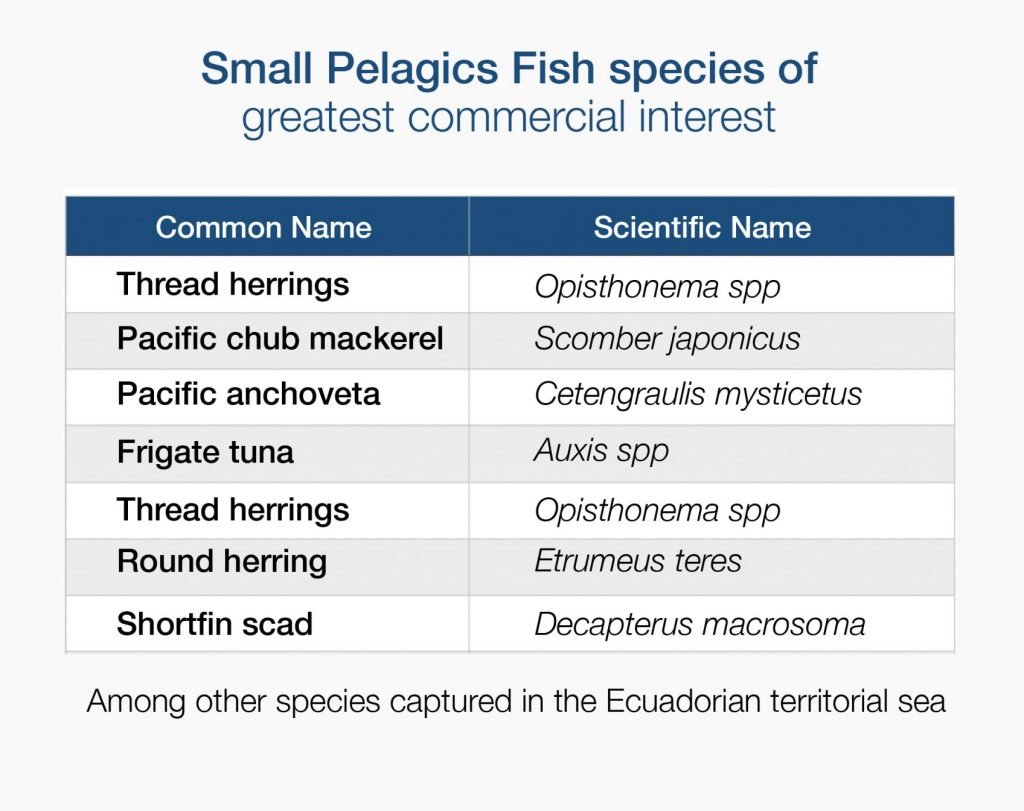The last stock evaluation developed by the Research Public Institute of Aquaculture and Fishing (IPIAP) on the state of small pelagic species stocks in Ecuador, shows significant progress in the state of Frigate tuna, Pacific anchoveta, Pacific chub mackerel, Thread herrings, Shortfin scad and Round herring between 2017 and 2019.
The evaluation concluded that in 2017, 100 percent of the six small pelagic stocks were overexploited and 50 percent were overfished. In 2019, the results of the stock evaluation determined that two of the species, Frigate tuna and Thread herrings, had come out of their state of overexploitation and none of the small pelagic stocks in Ecuador were overfished.
Juan Javier Garcia Bodniza, Director of IPIAP affirmed “the development of the last stock evaluation shows that the joint efforts between the public and private sector is resulting in the recovery of pelagic populations. As the National Investigation authority for the fishery sector, our commitment and work will always be directed towards guiding science-based decision making to contribute towards the sustainability of fishery resources in Ecuador”.
Fishery improvement Project promotes sustainability measures
Beginning in 2018, due to the effort of 22 Ecuadorian companies involved in the small pelagics fish supply chain, with technical support from the United Nations Development Programme (UNDP) Global Sustainable Supply Chains for Marine Commodities (GMC) Project and its partner Sustainable Fisheries Partnership(SFP), the Small Pelagics Fishery Improvement Project (Small Pelagics FIP) was established with the objective of improving the sustainability of these resources through measurable and verifiable improvements in fishery management.
The GMC Project and its partner SFP provided seed funding to initiate the Small Pelagic FIP, and in return, the Ecuadorian private sector FIP implementers committed more than $1.5 million dollars to implement the FIP’s five-year work plan. This FIP aims to achieve sustainable certification from MARINE TRUST, a unique international programme for marine ingredient certification.
Among the actions implemented to date is the adoption of voluntary management measures to reduce fishing effort and improve the stock status and sustainability of the fishery. The fisheries closure season was extended (over two periods), with a total of 61 days in 2017, 77 days in 2018, 83 days in 2019 and 80 days in 2020; and a seven-day closure was established during the full moon each month.
“This FIP represents our desire to ensure a supply of fish for many future generations, and to work in an environment of respect for law and nature. This journey has been complicated and the economic environment has been challenging, with low captures in the last few years and the pandemic. Despite this, milestones have been reached and the state of the fishery has improved,” emphasized Carlos Cacao, President of the Small Pelagic Commission for the National Chamber of Fisheries (CNP).
In parallel, the Government of Ecuador is leading a participatory governance approach called a “Sustainable Marine Commodity Platform”. This intersectoral decision-making platform based on a global methodology promoted by the UNDP, includes government and private sector representatives, fishers, processers, scientists and civil society involvement. They work together in the development of an Action and Management Plan for the Small Pelagics Fishery, in this way allowing for the definition of policies to improve the environmental, social and economic performance of this fishery and serving as an example for other species, such as Mahi Mahi.
“Ecuador is demonstrating that structured processes that empower and promote public-private alliances contribute to strengthening participatory governances that, at the same time, helps improve the sustainability levels of fisheries and their supply chains. These results encourage the continuation of our work for the common objective of achieving the sustainability of fisheries resources”, highlighted Andres Arens, Ecuador´s Vice Minister of Aquaculture and Fisheries.
Small pelagics, key species for the Ecuadorian fishery industry
The small pelagic fishery is the second most important industrial fishery in Ecuador and is of great economic and social importance in the country. The extractive activity, landings, processing (canning and fish flour) and exports generate high levels of foreign exchange, and the fishery provides jobs to more than 25 000 employees.

The resources considered in this fishery perform a key ecological role in marine ecosystems, and as such, the actions and commitment of different sectors not only contribute to achieving the sustainability of these resources but also serve as an example to be replicated in other fisheries and contribute to achieving the Sustainable Development Goals (SDGs) in Ecuador.
About the GMC Project
The Global Sustainable Supply Chains for Marine Commodities Project (GMC) is an interregional initiative implemented by the Ministries and Bureaus of Fisheries and Planning of Costa Rica, Ecuador, Indonesia and the Philippines, with technical support from the United Nations Development Programme (UNDP), facilitated by the Sustainable Fisheries Partnership (SFP) and funded by the Global Environment Facility (GEF).